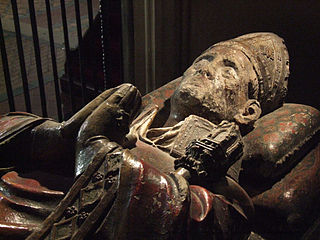Related Research Articles

Justus was the fourth Archbishop of Canterbury. He was sent from Italy to England by Pope Gregory the Great, on a mission to Christianize the Anglo-Saxons from their native paganism, probably arriving with the second group of missionaries despatched in 601. Justus became the first Bishop of Rochester in 604, and attended a church council in Paris in 614.

John Alcock was an English churchman, bishop and Lord Chancellor.
Æthelgar was Archbishop of Canterbury, and previously Bishop of Selsey.

The archbishop of York is a senior bishop in the Church of England, second only to the archbishop of Canterbury. The archbishop is the diocesan bishop of the Diocese of York and the metropolitan bishop of the Province of York, which covers the northern regions of England as well as the Isle of Man. The archbishop of York is an ex officio member of the House of Lords and is styled Primate of England; the archbishop of Canterbury is the Primate of All England.

The Bishop of Rochester is the ordinary of the Church of England's Diocese of Rochester in the Province of Canterbury.

John Sheppey was an English administrator and bishop. He served as treasurer from 1356 to 1360. Little is known of his family and background. A Benedictine, he was ordained deacon in 1318, and later studied at Oxford. Later he became involved in royal government, and was made bishop of Rochester on 22 October 1352. He was consecrated on 10 March 1353. He died on 19 October 1360, and was buried in Rochester Cathedral at the altar of St John the Baptist. As his will shows, he was a friend of his predecessor in the treasury, William Edington.
Ithamar was the first bishop in England to be Saxon-born rather than consecrated by the Irish or from among Augustine's Roman missionaries. He was also the first Saxon bishop of Rochester.
Putta was a medieval Bishop of Rochester and probably the first Bishop of Hereford. Some modern historians say that the two Puttas were separate individuals.

Gundulf was a Norman monk who went to England following the Conquest. He was appointed Bishop of Rochester and Prior of the Cathedral Priory there. He built several castles, including Rochester, Colchester and the White Tower of the Tower of London and the Priory and Cathedral Church of Rochester.
Adam Orleton was an English churchman and royal administrator.
Eardwulf was a medieval Bishop of Rochester.
Waermund was a medieval Bishop of Rochester.
Siward was a medieval Bishop of Rochester.
Arnost was a medieval Bishop of Rochester.

John was a medieval Bishop of Rochester.
John II was a medieval Bishop of Rochester, England.
Gilbert Glanvill or Gilbert de Glanville was a medieval Bishop of Rochester.
Benedict of Sausetun was a medieval Bishop of Rochester.
Richard Young was a medieval Bishop of Bangor and Bishop of Rochester.

John Low or John Lowe was a medieval Bishop of St Asaph and Bishop of Rochester, in England.
References
- Fryde, E. B.; Greenway, D. E.; Porter, S.; Roy, I. (1996). Handbook of British Chronology (Third revised ed.). Cambridge: Cambridge University Press. ISBN 0-521-56350-X.
- Smith, R. A. L. (1945). "The Early Community of St. Andrew at Rochester, 604-c. 1080". The English Historical Review . 60 (238): 289–299. doi:10.1093/ehr/LX.CCXXXVIII.289.